The 47th Street Farmer
| May 23, 2023When the daily commute to Manhattan’s Diamond District got to be too much, Zev Oster dabbled in agriculture closer to home in Rockland County
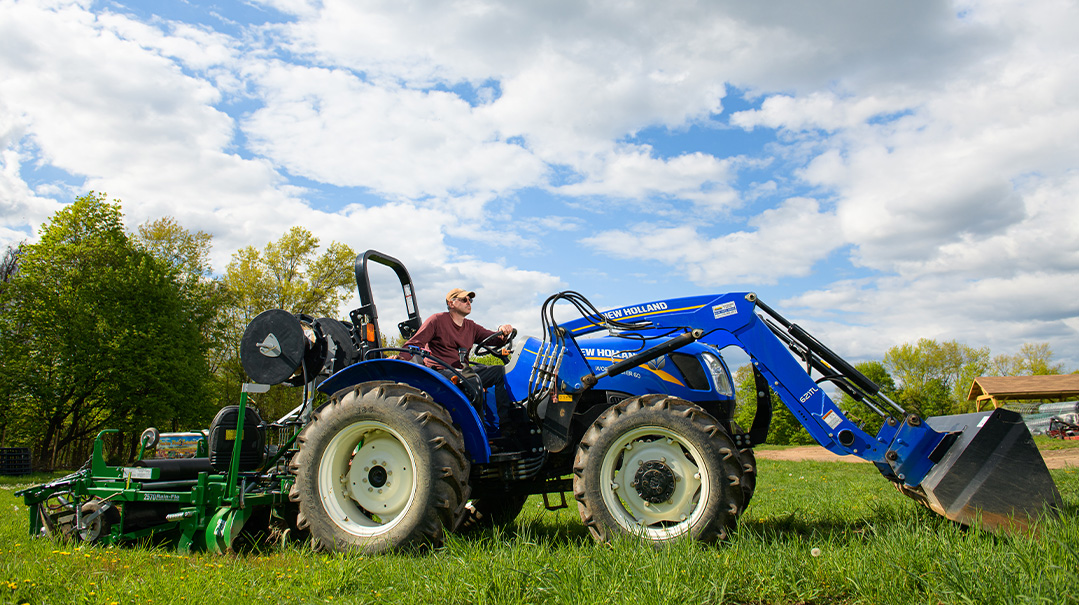
Photos: Naftoli Goldgrab
It was a warm afternoon in late July and the sun was already beginning to set when I pulled into the gravel parking lot of West Maple Farms in Monsey, New York. At the edge of the parking lot, a farmer’s stand proudly displayed tomatoes, cucumbers, garlic, and squash, all offset by neat rows of crops. The scene seemed more reminiscent of rural Pennsylvania than central suburban Monsey.
As I stepped out of my car, I heard the growl of an approaching engine, and then a John Deere Gator pulled up next to me, kicking up dust. In the driver’s seat, wearing a wide-brimmed hat, with sunburnt skin and muddy khakis, was the man I had come to meet.
“You’re late,” Zev Oster said with a smile. “Get in.”
Zev is the owner and driving force behind the farm, and he seems as comfortable on the land as Old MacDonald himself. But full-time farming is actually a relatively recent development for Zev, who spent more than 20 years working in the Diamond District on 47th Street in New York City.
But his days of rushing to make the Monsey bus to Manhattan are over; these days, Zev works locally. After Shacharis, he rushes to see to his roosters, emus, and ostriches. As the day progresses, he tends to the crops and harvests the honey in blazing heat, all the while welcoming a steady stream of visitors.
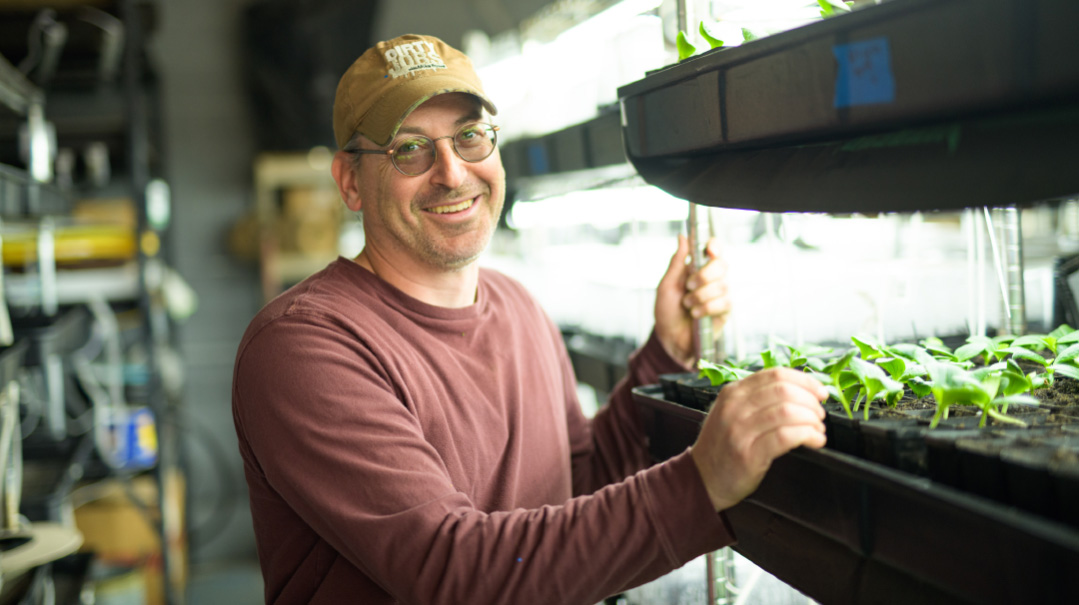
FULL-TIME FARMING As a bochur, Zev Oster spent summers enjoying the nature Monsey had to offer. These days after Shacharis, he visits his ostriches and tends to his crops
Call of the Wild
The school years, and the formal structure they mandated, presented a formidable challenge to a young Zev Oster.
“I went to every school until my parents realized that it wasn’t the school that was the problem,” he says. “Beis Dovid, Bais Mikroh, Chofetz Chaim, and then back to Beis Dovid. I was like a ping-pong ball. Most kids came to yeshivah, sat, learned, and played during recess. I just came for recess.”
He spent his summers enjoying the nature Monsey had to offer, hanging out in the woods, climbing trees, and getting paid a few cents to pick raspberries for the now-defunct Van Riper’s farm, which was only a bike ride away from his home.
He was 20 years old when he married Rivky Goldbrener, from Brooklyn.
“We met through a shadchan,” Zev confirms. “It wasn’t like I was milking a cow and my wife saw me and said, ‘Who is that guy?’ ”
After getting married in 1997, he needed to make a living, and his father, a self-employed wholesale diamond dealer like his father and grandfather before him, offered to help his son Zev join the family chain. He accepted and began the daily commute to Manhattan, but his heart wasn’t in it.
The young couple settled in Monsey and life became blessedly busy. Five children joined the family, two boys and three girls, and Zev would commute daily to 47th Street while his wife ran a jewelry store they had opened together in Monsey. He also founded magazines that achieved wide circulation — Diamond Pulse Magazine and Lab Grown Magazine. Both were business-to-business ad-based publications, with the former focusing on genuine diamonds while the latter on lab-grown ones.
Zev’s passion for the outdoors, which he maintained through various hobbies, had to be relegated to any extra time — when he wasn’t commuting or at work. He found the traveling difficult, but he kept at it nevertheless.
“I would wake up and take the Monsey bus,” he recalls. “Sometimes, if you missed the bus, you would have to wait half an hour or 45 minutes for the next bus, and sometimes it was standing room only. I would get to the city all farmattered, and if it was hot, I came into the office like a shmatteh.”
The industry itself was stressful.
“You’re walking around with a ton of goods on you, and anything can happen at any time,” Zev explains. “Also, I’m not a sitting guy, and I used to sit the entire day. The work just took a toll on me.” He shudders as he remembers it. “It wasn’t for me.”
Zev’s annual reprieve was the camping trip he took with his kids each year in the first two weeks of July, when the jewelry industry is closed. “The deeper in the woods, the better,” he remembers. “It was therapy for me. Doing these things was how I detoxed and unwound from work.”
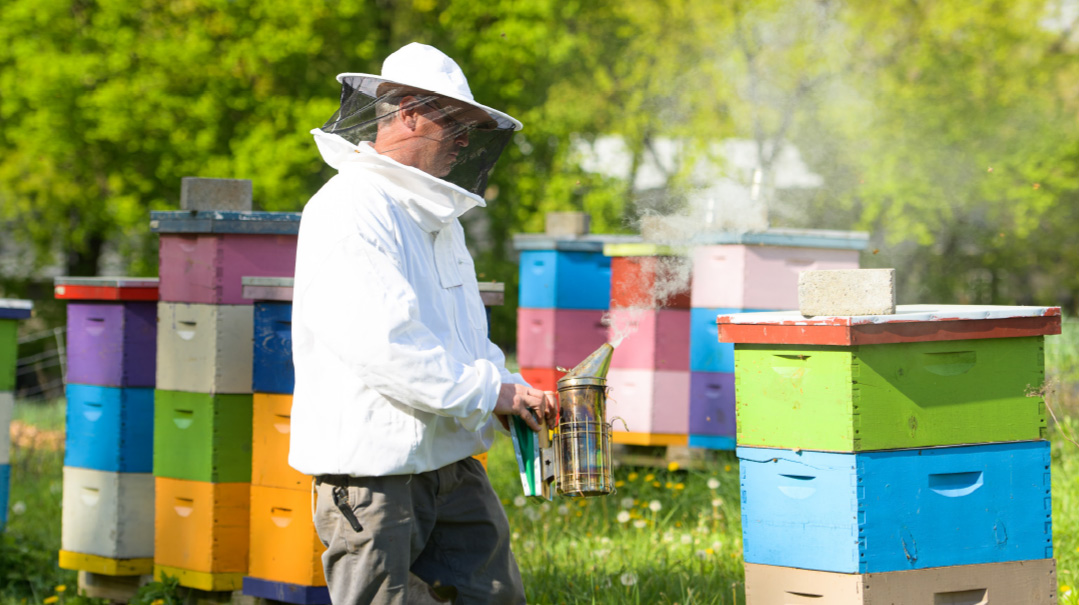
In January of 2015, Zev came across a documentary about beekeeping and was fascinated. He decided then and there that he would be a beekeeper, and he promptly placed an order for live bees. He knew nothing about them, but that didn’t deter him.
“They only get delivered in the spring, so I had time to learn,” he explains.
Zev posted on social media that he was looking for a mentor, and sure enough, he got a response.
Rabbi Daniel Senter, COO of the Kof-K hashgachah organization and a longtime beekeeper hobbyist himself, saw Zev’s post and offered his assistance. After a crash course in beekeeping basics from Rabbi Senter, Zev ordered the necessary equipment to house and care for the bees.
That same winter, he had also purchased a small property in nearby Montebello as an investment. When his bees arrived that spring, he moved them to the property, along with blueberry bushes he had been growing in his backyard, creating a thriving ecosystem for both the blueberries and the bees, which pollinated the bushes. Zev would attend to the hives daily after getting home from work, as well as on Fridays, Sundays, and other days off.
Soon, he began to do more extensive work on his new property. He gave it an official name: “Osterberry Farms,” created a website, and sent out updates on social media. Word got out regarding his new venture, but neighbors and friends who wanted to pick blueberries and see honeybees in action weren’t the only ones who noticed — the village of Montebello got on the case, too.
Zev was served with multiple violations on the property, though the village’s primary claim targeted his newest project: the bees. They argued that since the village zoning code contained no provisions permitting beekeeping, it was prohibited. They also served him with violations for running a commercial farm in a residential zone and for building an illegal gravel parking lot.
Zev wasn’t intimidated.
“I hired lawyers and had to go to court,” he remembers. “They threatened me with jail time and $5,000 per violation. I said I’m not paying anything, throw me in jail. We started petitions and got thousands of signatures to support beekeeping.”
The legal battle about the status of the hives would last until 2018. During the protracted three-year dispute, Oster signed an agreement with the town of Montebello that allowed him to keep the status quo on the land, but restricted him from making additional improvements until the litigation was settled. While Zev complied with the terms of the agreement, he still faced lots of hostility from the neighbors.
“They used to call the police when I was on the property,” he says. “The police would show up and ask me, ‘What are you doing here?’ I would respond, ‘What are you doing here? This is my property.’ ”
The locals’ passionate opposition was counteracted by the staunch support his family and friends offered. At one hearing, the courtroom was packed with both supporters and opponents of Oster. The judge entered the room and exclaimed, “Wow, we got a big crowd here, all for the bees!”
The conflict was eventually settled with the village’s new bylaw allowing hives on private residences, but there were strict terms and conditions. A growing bee colony requires more space, and beekeepers will add boxes to the hive to accommodate the colony’s growth, but the law regulated among other things the number of boxes per hive. The new law also stated that if the beekeeper violated any details, the village could put a lien on the property.
Zev found the compromise supremely unrealistic.
“The bees tell you when they need more space — they can’t say you can only have four boxes!” he says. “I took all my bees off my property the day after they passed the bee law.”
Zev then contacted Rockland County officials, who had been following his story all along and were eager to help, to see if they could help him find a new location for his bees.
“You’re doing a great service by pollinating the neighborhood,” they told him, and the county offered him a small plot of land on West Maple Road.
Looking back, Zev identifies the battle for the bees as a pivotal point in his journey. “This was what kind of turned me on to go full-force into my hobby,” he says. “If you do something wrong, and somebody calls you on it, you stop doing it. But if you’re doing something good and somebody says stop doing that, it’s not gonna happen. No, I’m not stopping. I’m going to continue.”
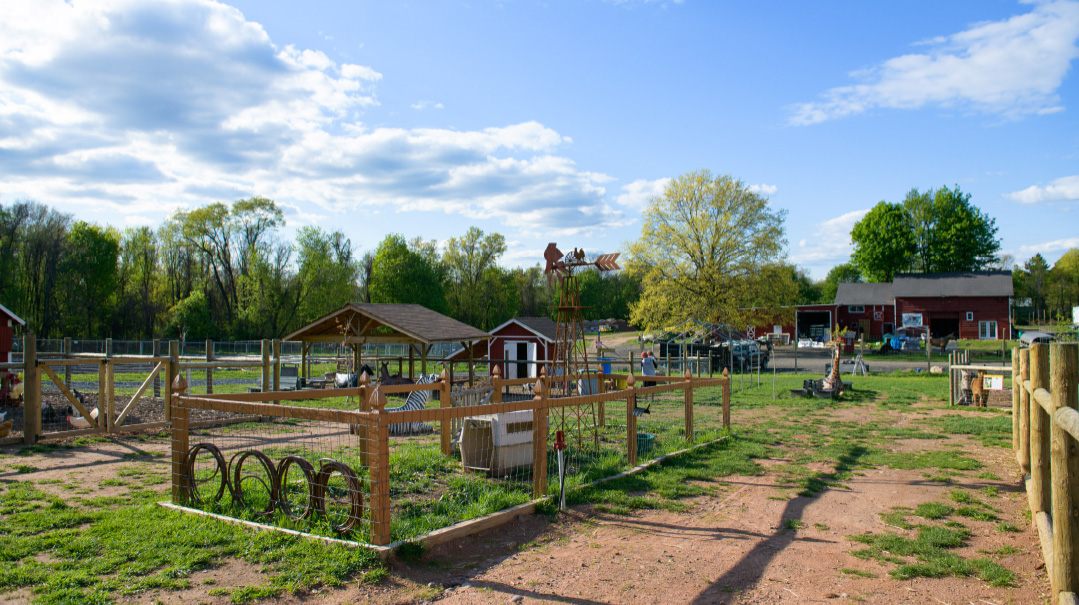
STOP RUNNING The Covid pandemic brought Zev’s Manhattan commuting days to a close, freeing him to dive into the farm. “Some people may call it a midlife crisis. I call it enough is enough”
Hold Your Horses!
In February 2020, Oster purchased the historic six-acre equestrian center Nickel O Farms in Clarkstown. He’d been dabbling in real estate for years, mostly buying fixer-uppers, renovating, and flipping them, and Nickel O seemed like a good investment that also fueled his outdoor passion.
A month after he closed on the Nickel O deal, Covid hit — and the world stopped. Now that Zev was no longer traveling to Manhattan, he was free to dive into the farm. He spent months renovating the property, and soon farming became his primary occupation, bringing his two decades as a jeweler to a close.
“Some people may call it a midlife crisis — I call it enough is enough,” says Zev. “I think the Covid shutdown gave people time to think. In Mitzrayim, when Pharaoh died, Bnei Yisrael had time to cry to Hashem. I think Covid did that to a lot of people. Like, stop running… where are you running to?”
Nickel O’s two main revenue-generators were the four residential rental units on the property, as well as a horse-boarding business that housed and maintained privately owned horses (it was not an agricultural property). To increase revenue even further, Zev created a petting zoo to which he charged admission.
Crunching the numbers, Oster realized that the petting zoo was doing really well, but the equine division of the farm was not, and he decided to shut it down. The farm had also featured a popular horse-riding summer camp for local Clarkstown children, which Oster continued, while dedicating half the summer to the Jewish population. Both groups filled completely.
“Everything I do is business-minded,” he explains. “If you enjoy something but you’re losing money, it’s not fun.”
About a year after he purchased Nickel O, Zev was forced into another battle of wills when a Clarkstown inspector threatened to close it down. The inspector claimed that the property, which was in a residential zone, had been grandfathered into the location as a horse farm. The exemption of the area’s new zoning laws applied only to a horse farm and did not extend to a petting zoo. He also claimed the allotted parking space was insufficient.
“Listen here,” Zev told him. “I already went through this with Montebello, all the bullying and harassment, and I’ll spend every last dollar to fight you guys. This is a legal farm and I have the right to have animals here.”
“See you in court,” was the inspector’s laconic reply.
Zev didn’t wait for a summons. That same day he emailed two local councilmen and the town supervisor, George Hoehmann.
I’m not going to fight you, I know what I’m doing is correct. You have a choice: either you can have a farm here in Rockland County, or if not, then I’ll sell or build on it.
The responses weren’t long in coming. Within 24 hours, one of the councilmen and Mr. Hoehmann made an appointment to visit the farm and meet with Zev. They were duly impressed with Nickel O and told him, “We love what you’re doing here and there’s no reason you should be shut down — we’ll get this straightened out.”
Another meeting was set for a week later, officially to give both sides time to present their cases, but in reality to allow the town to save face while gracefully backing off.
It was during this last conflict with Clarkstown that a property Zev had been eyeing for a while became available. The old farm on West Maple Road where Rockland County had allowed him to place some of his bees years earlier was partially privately owned and partially owned by the county. Now, the private owners had passed away, and Zev quickly contacted the heirs and purchased their portion.
He was enthusiastic about the opportunity this new land offered, because Nickel O was primarily a horse farm and wasn’t suitable for growing crops, which was Zev’s true passion. The new land, however, would allow him the space to do so, and Zev’s focus shifted to the farm on West Maple Road.
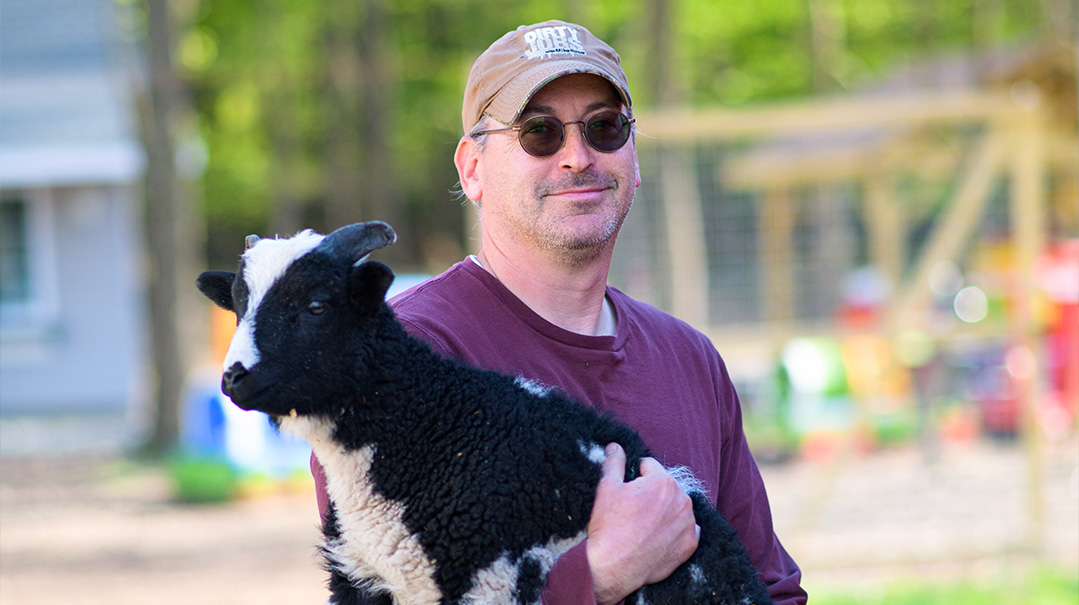
Setting up the infrastructure for the new farm, buying the equipment, and managing operations was a colossal task. And that was before any actual farming. Originally, Zev planned to hire an experienced farmer to run it the first year while he learned the ropes — but he was too late. He had bought West Maple Road in January 2021, and freelance farmers usually commit to jobs in November and December. “So it all fell on me — I also had to be the farmer the first year,” he says.
The new farmer made mistakes that first year, but he was a quick learner.
“We planted tomatoes that first year and a lot of the plants started shriveling up in the middle of the season,” Zev says. “Turns out, there was a fungus, fusarium crown, in this particular area. But until we realized it, we had rows and rows of tomatoes that were going bad. So we replaced them with squash, which doesn’t react to the fungus that way. It was trial and error, and we learned on the job.”
There were light moments too. Zev had asked Greg, the local mailman, to keep an eye on the property on Shabbos and Yom Tov. One Shavuos, Greg came into shul and told him that one of his goats had escaped, and that he and some others had tied it to a trailer on the farm.
“That doesn’t make any sense, I thought. All my goats are enclosed,” Zev remembers.
On Motzaei Yom Tov, he went to check it out. Sure enough, there was a goat tied to a trailer, but it wasn’t his! Zev was rather puzzled; whose goat was it? And what was it doing on his property? A local woman told him there was a yeshivah down the block where the bochurim kept some animals. They had gone away for Yom Tov, the goat had escaped, and when Greg saw it, he assumed it was from West Maple. A few days later, someone from the yeshivah asked Zev if he wanted to keep the goat. He kept it until it got loose and chased one of his workers, after which he sold the goat on Craigslist.
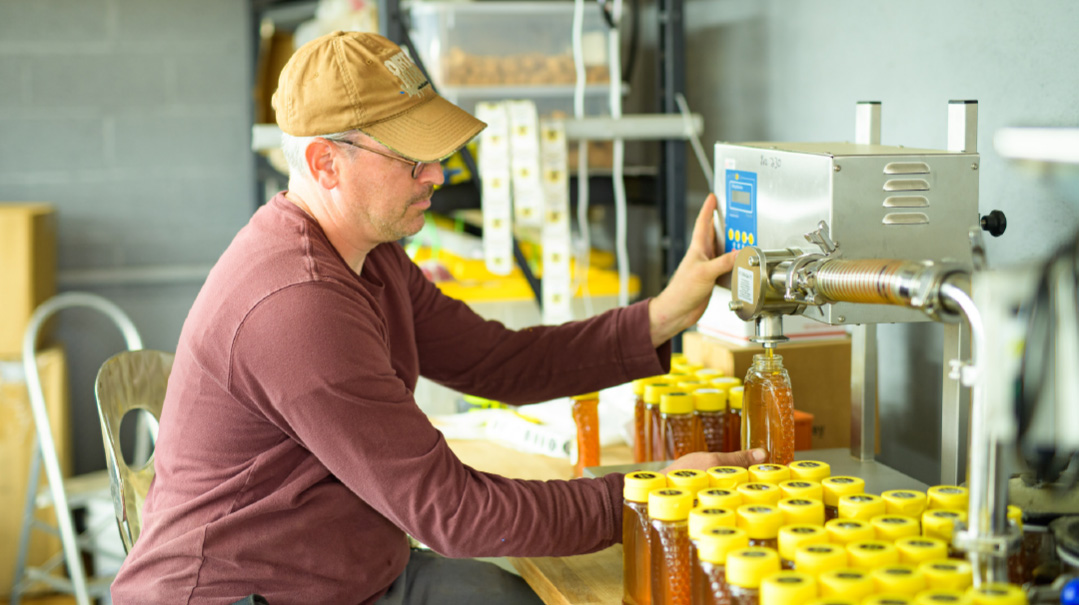
SWEET PROFITS Production is subject to rainy springs and bear markets, but this year Zev managed to get about 2,200 pounds of honey, including a kosher l’Pesach run
Working It Out
It’s been a couple years, and by now, Zev estimates they’ve gotten over the steepest part of the learning curve. West Maple Farms is a successful 15-acre operation with the potential to expand to 30. Although a relatively small farm, it punches above its weight in terms of the wide variety of produce, animals, and recreation areas.
Zev and his employees are busy from morning until evening tending to the crops, which include tomatoes, peppers, cucumbers, squash, garlic, zucchini, eggplant, blueberries, Brussels sprouts, leek, and kohlrabi. The farm also houses a multitude of animals, guided hayrides in Yiddish and English, and a parakeet house, as well as a unique play-picnic area that features a retired fire truck and a US Army truck.
West Maple Farm is also the base of Zev’s honey production, sold under the Rockland Honey label. It is produced on-site and sold in many local grocery stores. The farm even has a separate kosher-for-Passover run, for customers who want the extra stringency.
Zev explains that honey production isn’t consistent and depends on various factors.
“The most honey I’ve ever produced was 3,500 pounds,” he says. “This year we got about 2,200 pounds. It has to do with how many bees survive the winter and how rainy the spring is. If it rains a lot, the bees can’t go out and forage. It also has to do with bear attacks. Sometimes hives get knocked out by bears, and you lose 40 to 50 pounds of honey per hive.”
The Osters closed their Monsey jewelry store a few months after buying Nickel O, and today Zev’s wife Rivky handles visitors’ reservations at the farm.
“I come from Boro Park, where we didn’t do these kinds of things,” she freely admits. “We had only a little square of grass outside of our house. Then I married Zev, a nice yeshivah boy who was going into the diamond business — and lo and behold, he becomes a farmer! It was a surprise, but I embraced it. Now, I wouldn’t change anything.”
Zev himself admits that he was a little concerned about how his unconventional career switch might affect his children’s shidduchim, but he married off a second child, a daughter, after he already owned Nickel O and West Maple (one of his sons had gotten married before he started farming).
“I guess farming is not too bad at the end of the day,” he says.
While Zev has embraced the switch from 47th Street to the farm, he doesn’t look back at those years as wasted time.
“I’m a go-guy,” he says. “When there’s something to do, let’s do it. Much of that mentality came from my time in diamonds — that very strong drive. Something like this farm won’t happen if you’re going to be laid back. And the diamond business led me to the magazine business, which is my bread and butter until today.”
(The farm is profitable enough to cover operating costs, but it’s not yet a viable parnassah; the magazine revenue is what gives Zev the freedom to pursue his purely passion projects.)
By now it’s almost evening — the sun is setting and the last of the visitors have left. Zev Oster hasn’t eaten all day; he bends and fingers ripe produce in the rows of cherry tomatoes and cucumber plants.
“Hmm… this is good,” he says, biting into a cucumber that’s as fresh as you can get.
Then he straightens up and looks around at the farm he’s built with his bare hands.
“To do this, you have to have a passion for it,” he says. “It makes me feel happier, more fulfilled. Just like someone who’s a builder likes building—” He pauses.
“I like farming.”
(Originally featured in Mishpacha, Issue 962)
Oops! We could not locate your form.







